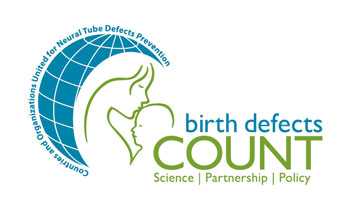CDC's Work

Birth Defects COUNT (Countries and Organizations United for Neural Tube Defects Prevention) is a global initiative to reduce death and lifelong disability resulting from neural tube defects, which are serious birth defects of the brain and spine.
CDC’s National Center on Birth Defects and Developmental Disabilities is working with the World Health Organization (WHO) and other partners on Birth Defects COUNT. The initiative builds on the success of folic acid fortification of cereal grain products labeled as enriched in many countries. A key strategy of the initiative is to increase folic acid intake among women of reproductive age to prevent neural tube defects. These efforts can have a significant impact on death and lifelong disability worldwide.
The three focus areas of Birth Defects COUNT are:
- Science
- Partnerships
- Public health policy
Science
(Surveillance, Epidemiology, and Laboratory Capacity)
Public health surveillance and epidemiology provide the information needed to make informed decisions related to birth defects efforts. They can also help assess whether these efforts are having an impact.
Many countries do not have surveillance systems that track neural tube defects and other visible birth defects. Also, most do not have the resources to measure the amount of folic acid needed in the blood to prevent neural tube defects. Currently, CDC is working with the World Health Organization (WHO) and the International Clearinghouse for Birth Defects Surveillance and Research to help countries develop and strengthen birth defects surveillance, epidemiology, and laboratory capacity for birth defects prevention.
Birth Defects COUNT Partners
- World Health Organization
- Flour Fortification Initiative
- International Clearinghouse for Birth Defects Surveillance
- Smarter Futures
- International Federation for Spina Bifida and Hydrocephalus
- Center for Spina Bifida Research, Prevention and Policy
Partnerships
A global network of partners with expertise in conducting folic acid activities and neural tube defects surveillance is a key piece of the initiative. CDC knows the vital role partners play in moving birth defects prevention forward globally. Currently, CDC is working with key partners in South-East Asia, East Africa, and Latin America to strengthen and support birth defects prevention efforts.
With partners, CDC will help to:
- Improve tracking of neural tube defects and other birth defects;
- Monitor fortification efforts; and
- Improve ways to measure the amount of folic acid needed in the blood to prevent neural tube defects (optimal blood folate concentration).
Public Health Policy
Building on the success of folic acid fortification in the United States and other countries, CDC is partnering with WHO, the Flour Fortification Initiative, and others by supporting the development of global guidelines, working to increase the number of countries with fortification policies that include folic acid, and determining a global optimal blood folate concentration for neural tube defects prevention.
Get Involved
Partners and public health professionals can get involved in the effort by:
- Joining our mailing list to receive newsletters and other updates;
- Learning more about our birth defects surveillance training opportunities; and
- Contacting us for technical assistance on projects related to birth defects prevention.
- Page last reviewed: November 21, 2016
- Page last updated: September 21, 2015
- Content source:


 ShareCompartir
ShareCompartir